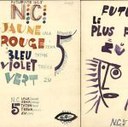0137 On Being Modern: Possibilities of Resistance through Primitivism and Ingenuousness in Ernesto de Sousa and Almada Negreiros
Identifiers (Article)
Identifiers (Files)
Abstract
This paper aims to contrast the particular uses of the modern categories of ingenuousness and primitivism both in José de Almada Negreiros and Ernesto de Sousa within their broader presence in twentieth century art. In so doing it seeks to contextualize multiple ways of understanding modernity and its legitimation through discursive practices. Ernesto de Sousa reinterpreted an idea of modernity that followed up on Almada Negreiros' modern experience. The concept of "voluntary ingenuousness" was developed by Almada after the 1920s, but it had its roots in the futurist proposals he embraced in the first decades of the twentieth century. Primitivism and ingenuousness were the fundamental terms for Almada Negreiros and Ernesto de Sousa through which they reinvented themselves as well as modernity and forged liberty within a dictatorship regime.
Statistics


License

This work is licensed under a Creative Commons Attribution-NonCommercial-NoDerivatives 4.0 International License.



